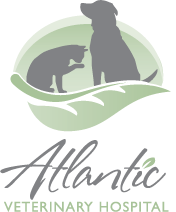The day after Thanksgiving can be one of the busiest days of the year at:
A) the local mall
B) Atlantic Veterinary Hospital
C) both of the above
If you answered “C,” you’re right!
Sadly, many family pooches also overindulge on Thanksgiving and we often see them the next day in the hospital for gastric disturbances.
In some severe cases, dogs can develop life-threatening—and very painful—pancreatitis requiring hospitalization. Some of the common culprits include:
- turkey skin
- pie crusts
- butter
- gravy
- bacon
- fatty table scraps
- other high-fat foods
Why not feed your pooch these goodies?
The high fat content in these foods causes high blood liquids. This de-stabilization of pancreatic enzymes causes the pancreas to digest itself instead of digesting food in the intestines.
Turkey legs and bones
Sharp bones can get stuck in your dog’s esophagus, or in the stomach or intestines, which could perforate or rupture the intestines.
Raisins, onions, and garlic
Raisins in mincemeat pie and carrot raisin salad can cause fatal kidney failure, while onions, leeks, garlic, and chives can cause liver failure.
While you’re cooking that feast…
- Keep your four-legged friend out of the kitchen.
- Make sure your guests know to keep their food out of your pet’s reach and to ask your permission before feeding your pet any treats.
While you’re enjoying your meal, don’t let your dog entice you (with those big, brown, sad eyes) to sneak him any high-fat foods under the table.
When you’re relaxing after dinner, make sure the food is put away and that the trash is dumped so your dog can’t help himself.
What’s safe?
If you must fix him a plate, a little lean turkey breast and some plain vegetables will do just fine.
Best of all, give him a hug and let him give you a big wet kiss. It’s Thanksgiving, after all, and the unconditional love you receive from your pet is love in its purest form. Be thankful!

